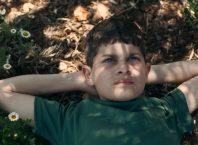By Shlomo Porath
The summer is upon us. As far as I am concerned, this means that the film-going year of 2009 is finally beginning in earnest. From January until May, the films released to theaters in the U.S. are an assortment of oddities, films deemed for whatever reason to be non-starters in both the blockbuster summer season and the award-centric fall season (early winter is something of a mix of award films and holiday blockbusters). The most popular studio releases seem to be D-grade horror movies and comedies. There are a handful of quality releases, but they are few and far between, often coming out in Israel only in June. One of the few positive attributes of this phenomenon is that it grants one time to catch up on any films he/she might have missed from the previous year. When, last week, the only new offering at local movie houses seemed to be Terminator: Salvation, I went out and rented two acclaimed independent 2008 films I missed (though I’m fairly certain that neither got a local theatrical release). Both films have female directors and focus on female protagonists against a backdrop of financial hardship.
Frozen River is a debut-feature, written and directed by Courtney Hunt. It stars Melissa Leo as Ray Eddy, a late 40-ish woman in upstate New York, whose husband has just run-off to Atlantic City with the money they’d been saving for a double-wide trailer for them and their two sons. In fear of losing the deposit they’d put down, Ray, working at an entry level position at a Dollar store, starts making smuggling runs across the frozen St. Lawrence River, smuggling illegal aliens from Canada to the US. The river happens to bridge two parts of a Mohawk reservation, where the jurisdiction of the borders patrol is limited. Ray discovers this loophole through Lila Littlewolf, a young woman of the reservation. Lila wants money to care for her son, who was taken by her mother-in-law after her husband left the reservation.
From this rather bleak plot, Hunt has crafted a small and beautiful gem, a heartfelt portrait of two women determined to provide for their children. This is set-up from their very first meeting- after Lila steals Ray’s car (in order to get to her job at a bingo parlor), Ray brandishes a gun which she will willingly use to protect her interests. Although they begin the smuggling business somewhat tentatively -with some trickery and coercion on Lila’s part- Ray quickly jumps at the opportunity to make the money for the double-wide. She knows that she is delivering the immigrants to people who are going to enslave them until they work off the $50,000 demanded to buy their freedom with, but is undaunted.
Melissa Leo has appeared in numerous films and television parts (21 Grams, The Three Burials of Melquiades Estrada, Law and Order), generally with only a handful of scenes. Here, in here first significant starring role, she is really a revelation. Those who say that there are so few good roles for woman are correct, particularly for women in the 40+ age group. Leo sinks into this unglamorous role with a single-minded intensity unmatched by any female performance I’ve seen in recent years. She brings the character to life and never attempts to whitewash anything, even though Ray does some things that are very unwise and unkind. Misty Upham, a non-professional actor with less screen time, manages to be the perfect counterweight to Leo. Her character is in many ways quieter, more complacent, more tempered, but ultimately just as focused. She forces Ray to question her own actions, to open up to the world a bit. The two women bounce off one another, expanding each other’s outlook, and the effect of their interactions is a small dose of kindness and sympathy in these cold and bleak circumstances.
There are not many other characters in the film, but two others must be pointed out. The first is Ray’s eldest son, T.J., played by Charlie McDermott. While Ray is out trying to make money, it falls to T.J. to care for his younger brother, while dealing with his affection for and disappointment in both his parents. It is another wonderful and precise portrait, this time of teen-aged confusion. The other element is the location, which is a character in and of itself. It is cold and uninviting, yet those attributes also make the little moments of kindness and humanity all the more impactful. At times, the way Hunt shoots it, it takes on the qualities of a western- the vast, flat, clean surface of the St. Lawrence River feels like the planes one might see in a western and the lack of regular law-enforcement in the reservation echoes the lawlessness prevalent in the genre. That comparison also adds to the appreciation of the treatment of the Mohawk community. As opposed to most westerns, they are neither fierce savages nor mystical abstractions.
The movie has its short-comings –a rather melodramatic development late in the film, followed by an unnecessarily on the nose Christmas miracle- but I was deeply impressed by the work of all involved. The film received a number of awards and nominations, including Academy award nominations for Ms. Hunt’s screenplay and Ms. Leo’s performance, which were richly deserved.
From the oppressive icy planes of upstate New York, we go to the more mundane oppression of a small Oregon town. Wendy and Lucy, directed by Kelly Reichardt, based on a short story by Jonathan Raymond. Reichardt and Raymond collaborated on the screenplay. It is a spare, quiet film, with a meditative tone. It leans towards the poetic, feeling more remembered than captured in the moment. Tonally, it is quite similar to Reichardt’s two previous films, River of Grass (1994) and Old Joy (2006). Both those films are about lonely characters who feel disconnected from the world. I did not connect with River of Grass, which felt to me like a filmmaker of distinct sensibilities trying to fit into the independent film zeitgeist of the mid-90’s (it involves a lonely man and lonely house-wife trying to get away and perhaps start a crime spree, but never really managing it). Old Joy, on the other hand, resonated with me in a profound way. It is about two men in their 30’s that were at school together going to a natural spring, trying to recapture the bond they once showed. It is a very melancholy piece, a film which, if one can accept the lethargic tone of it, could resonate with anyone who misses ‘The good old days’, be it school, the army, a relationship, or any other long-gone period.
Compared to Old Joy, Wendy and Lucy are positively packed, plot-wise. Wendy, played by Michelle Williams, is a young woman escaping an unspecified past whose goal is get to Alaska and work there. As she puts it: “I hear they need people there” (plain and devastating). Lucy is her dog and only companion. While making their way up north in their car, they come upon a small Oregonian town, where Wendy finds a parking lot they can sleep in. Upon being roused by a security guard -who, not unkindly, tells her that she can’t park there- she finds that the car won’t start. There is a mechanic down the block, but he won’t be open for a while. While waiting around, Wendy discovers that she’s out of dog food. Hoping to save her limited cash supply, she ties Lucy up outside a supermarket and attempts shop-lifting. A decidedly unkind employee catches her and turns her in to the police, where she is processed, fined and released. Upon her return, Lucy is gone. Understandably frantic, Wendy posts fliers, goes to the pound, uses the kindly security guard’s cell-phone to try and find Lucy, while simultaneously trying to get the car fixed.
That is the structure Reichardt uses to quietly explore the circumstances of a person in the underbelly of society. The film has been called political, and obviously a film dealing with a person’s relationship to society can be seen as political allegory. Indeed, upon its release, the film received largely glowing reviews, many of which saw it as an essential political piece in light of the financial turmoil that shook the world last year. Although that is a very sound way of examining the film, I found that the more specific lines could be drawn from the personal story to the political climate, the less engaged I was. Although this film, like Frozen River, was made before the recent collapse, I found that the political connotations brought it down from its poetic haze to a prosaic reactionary level, something I was not terribly interested in. I feel bad for having misgivings about a film I otherwise liked because of entirely extraneous events, but I don’t think a filmgoer should (or could) ignore context.
Williams, who is on a run of interesting and challenging film roles, does a beautiful job of anchoring the film. Her Wendy is very relatable- a sweet, ultimately optimistic person, who latches on to whatever kindness and shreds of hope she comes across. She does some unwise things, but Williams allows the audience to feel a great deal of empathy for her character’s predicament, even in the excruciating shop-lifting scene, which we know that it’s a bad idea that will only lead to more misfortune. It’s those moments, the ones that enabled me to step away from my preconceptions, moments that enabled me to connect with the humanity of it all- that ultimately made the film for me. Not as an exposé on how down-trodden the down-trodden really are, but as a humane look at people who generally might elicit little more than self-righteous liberal guilt on my part.
The only caveat I have with the character of Wendy is the choice of her physical appearance. I was reminded, strangely and distractingly, of Terrence Stamp’s performance as the title character in Peter Ustinov’s film Billy Budd- a kind of androgynous creature, a saintly image, something that annoyingly pushed the element of allegory and myth that distracted from the humanity. But that’s probably just me. This is a serious, contemplative work and for what it is- an elegant one. It’s not jarring to the sensibilities like, say, the films of the Romanian new wave, with their artfully-artless hand held slices of life. It’s designed, composed, and carefully put together. If you are the kind of person who likes a quiet, lethargic film every now and again, I would very much recommend this film and Old Joy as well.





